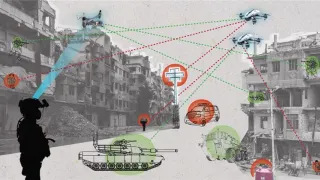International law on the conduct of hostilities limits methods and means of warfare
International law on conduct in armed conflicts aims to balance legitimate military action with humanitarian objectives to reduce suffering, especially among civilians. Historical unwritten agreements on the conduct of warfare evolved into formal legal limits in the 19th century, culminating in treaties such as the Geneva Conventions.
Key principles include distinction (between military and civilian targets), proportionality (matching means to objectives) and bans on indiscriminate attacks, terrorizing civilians, hostage-taking and human shields.
IHL also covers protection of the wounded, respect for medical facilities, safeguarding cultural property and the environment, and regulations on weapons use, including bans on biological, chemical and blinding laser weapons and anti-personnel landmines. The 2008 Convention on Cluster Munitions is a recent addition.









